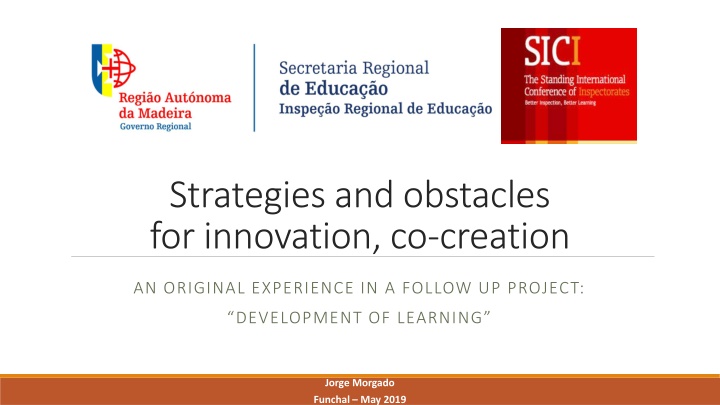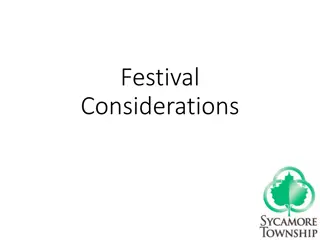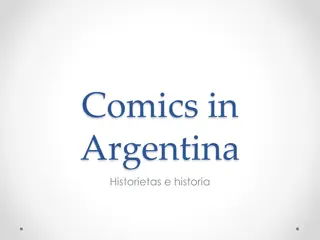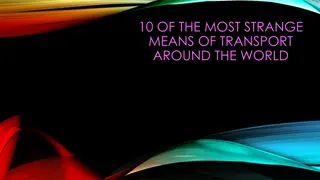
Innovation and Co-Creation: Strategies and Obstacles for Development
Explore the journey of fostering innovation and co-creation in a follow-up project focusing on the development of learning. Discover the mission, vision, values, and programs of the Regional Inspectorate of Education, emphasizing quality education and inclusive practices. Gain insights into a new vision and approach for basic and secondary education curriculum.
Download Presentation

Please find below an Image/Link to download the presentation.
The content on the website is provided AS IS for your information and personal use only. It may not be sold, licensed, or shared on other websites without obtaining consent from the author. If you encounter any issues during the download, it is possible that the publisher has removed the file from their server.
You are allowed to download the files provided on this website for personal or commercial use, subject to the condition that they are used lawfully. All files are the property of their respective owners.
The content on the website is provided AS IS for your information and personal use only. It may not be sold, licensed, or shared on other websites without obtaining consent from the author.
E N D
Presentation Transcript
Strategies and obstacles for innovation, co-creation AN ORIGINAL EXPERIENCE IN A FOLLOW UP PROJECT: DEVELOPMENT OF LEARNING Jorge Morgado Funchal May 2019
Regional Inspectorate of Education Regional Inspectorate of Education 2019 is the third year of the Regional Inspectorate of Education as a department directly dependent of the Madeira Regional Secretary for Education.
Mission Mission To safeguard the public education service, with inspective actions that promote the pedagogical and organizational quality of schools.
Vision Vision To assure the quality of education for children and students in a perspective approach of education for all, human rights and inclusion.
Values Values Respect for people; Improvement of the organization; The school centrality as an educational organization; The public interest.
Programmes and activities Programmes and activities Monitoring Audit Control Ombudsman and disciplinary proceedings Education, national and international, meetings and workshops And also training that joins inspectors, headmasters, teachers from pre-primary, primary, middle and secondary levels and teachers from universities with recognized merit in these domains.
A new vision a new approach A new vision a new approach A new framework of basic and secondary education curriculum.
A new vision a new approach A new vision a new approach Common framework for all schools and educational offerings in the scope of compulsory schooling, namely curriculum, planning, teaching and learning and in the internal and external assessment of student learning.
A new vision a new approach A new vision a new approach The Student Profile points to a humanistic-based school education, in which the students of this generation build up a scientific and artistic culture. With this purpose, they mobilize values and skills that allow them to intervene in the history of individuals and societies, to make free and informed decisions on natural, social and ethical issues, and to develop a conscious and responsible capacity for civic and active participation.
A new vision a new approach A new vision a new approach Essential Learnings "The common set of knowledge to be acquired ... indispensable ... relevant and significant, as well as the capacities and attitudes that must be developed by all students ..."
A new vision a new approach A new vision a new approach National strategy for citizenship education
A new vision a new approach A new vision a new approach The autonomy and flexibility of curriculum: "The curricular autonomy is granted to schools within a range of between 0% and 25% (of the total workload) is locally built at the initiative of each school." An inclusive school: where each and every student, regardless of their personal and social situation, obtains responses that enable them to acquire a level of education and training to facilitate their full social inclusion .
A new vision a new approach A new vision a new approach The Regional Inspectorate of education has to develop a new culture of cooperation between inspectors and all the members of the educational community, in order to promote a new and better response of school organization and the quality of education of our children and students.
A new vision a new approach A new vision a new approach Innovation Co-creation Strategies and obstacles
Conditions for innovation Conditions for innovation 1- Planning: 1.1. leadership, vision and strategy; 1.2. resources and socio-educational action. 2- Operationalization: 2.1. planning at group and class level; 2.2. implementation and monitoring.
Conditions for innovation Conditions for innovation 3- Evaluation: 3.1. verification of compliance with the plan and the objectives. 4- improvement: 4.1. action plan for improvement.
PDCA cycle PDCA cycle - - Cycle of Deming Cycle of Deming (USA, 1900-1993) Plan Continuous improve- ment Act Do Check
Monitoring project: Development of learning
The Full Time School in Madeira The Full Time School in Madeira The Full Time School in 1st. cycle of basic education, progressively implemented in the Autonomous Region of Madeira, since 1994/1995, is a model of school-time organization that ensures children occupation at school in extended hours dividing the daily time in curricular activities and activities to enrich the curriculum. The enrichment curriculum activities seek to provide students with broader competencies, such as social, linguistic, digital, artistic and sportive skills, aiming their preparation for future competent citizens. Furthermore, this scheme provides occupation of children safely, allowing parents to perform their professional duties.
The Full Time School in Madeira The Full Time School in Madeira Primary school (6 10 years old) Since 1994/ 1995 Curricular activities Enrichment activities Enrichment activities Curricular activities
The Full Time School in Madeira The Full Time School in Madeira To provide students with: Provides safe occupation of children; Social Linguistic Allows parents to comply with their professional duties; Digital Artistic Sportive Equal opportunities for all SKILLS
Development of learning: aims Development of learning : aims Observe and analyse: the school planning, implementation and evaluation of the students learnings. the measures adopted by the school to improve the results of learning. Improve organizational and operational practices that lead to the development of students' learning and achievement. To assure the constitutional rights of citizens regarding equal opportunities on accessing school success.
Scope Scope 9 of 11 counties involved; 6 inspectors; 10 schools; 10 headmasters; 914 children; 1081 students; Soon! 359 teachers; 270 non-teachers; and parents.
Procedures Procedures The projet begins with a public presentation to the educational community such as teachers, non-teachers, parents, students and other representatives of regional, local, social and economic interest. Meetings with the headmasters. Interviews with members of the educational community.
Procedures Data collection and analysis of planning documents: medium and short terms; external and internal school results; performance reports; evaluation of the planning.
Procedures Procedures The results of the intervention are presented, by the team of inspectors, in a synthetic report: Most successful results; Results that needs improvement.
Procedures Procedures Based on the synthetic report, school draws its own action plan for improvement: Strategies and obstacles for innovation; To promote a new and better response of the school organization; To assure the quality of education of our children and students.
Procedures Procedures The action plan is monitored by the team of inspectors; Final report with the participation of the school Co-creation and cooperative work (with the inspectors, headmasters, teachers, non teachers, students, parents and other representatives of the educational community).
Procedures Procedures There will be a final report regarding the schools involved in the project which will be presented to all schools of Madeira. We expect to
We expect to We expect to contribute to improve schools educational response; promote students school success; change the culture of students retention; promote the critical spirit; foment the assumption of the ethical commitment; transform socio-educational reality!
The final report The final report The final report will contribute with essential information to the Regional Secretary of Education in order to (re)formulate education and training policies.
Development of learning,a regional experience, points strategies and obstacles for innovation, in order to improve the education and learnings of the children and students of Madeira`s education system.




